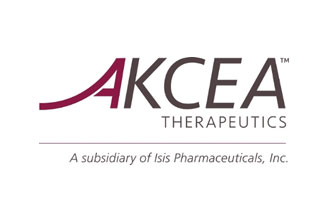
Akcea Therapeutics, Inc., an affiliate of Ionis Pharmaceuticals, Inc., focused on developing and commercializing drugs to treat patients with serious cardiometabolic diseases caused by lipid disorders, announced the initiation of a phase 2b clinical study of AKCEA-APOCIII-LRx in patients with hypertriglyceridemia and established cardiovascular disease (CVD). The study will evaluate the safety and efficacy of different doses and dosing frequencies of AKCEA-APOCIII-LRx in this patient population and provide valuable information for a potential phase 3 cardiovascular outcomes study
AKCEA-APOCIII-LRx is part of a strategic collaboration with Novartis to develop and co-commercialize AKCEA-APO(a)-LRx and AKCEA-APOCIII-LRx. Under the terms of the collaboration, if Novartis exercises its option after successful completion of the phase 2 study, it will be responsible for a global phase 3 cardiovascular outcome study as well as worldwide development and, if approved, global co-commercialization activities.
AKCEA-APOCIII-LRx, an antisense drug that uses Ionis’ advanced LIgand Conjugated Antisense (LICA) technology, is designed to reduce the production of apolipoprotein C-III, or apoC-III. Elevated levels of apoC-III correlate with high triglyceride levels and have been associated with metabolic abnormalities and premature cardiovascular disease.
“The combination of elevated levels of apoC-III and triglycerides has long been linked with cardiovascular disease, but, until now, no drug has been capable of addressing both risk factors. In our phase 1 study AKCEA-APOCIII-LRx significantly reduced both apoC-III and triglycerides up to 84% and 71%, respectively, and demonstrated a good safety and tolerability profile,” said Louis O’Dea, chief medical officer at Akcea Therapeutics. “These data strongly support further evaluation of AKCEA-APOCIII-LRx. We believe positive results from studies in this broad patient population could lead to wide-ranging advances in the treatment of people with apoC-III and triglyceride-driven cardiovascular disease.”
The multicenter, randomized, double-blind, placebo-controlled, dose-ranging phase 2b study will evaluate the safety and efficacy of AKCEA-APOCIII-LRx in approximately 100 patients with hypertriglyceridemia and established CVD. Akcea anticipates reporting top-line data from this study in 2019.
Akcea recently reported data from a phase 1/2a clinical study of AKCEA-APOCIII-LRx in healthy volunteers and patients with elevated triglyceride levels. Patients in the study were treated with multiple doses at either weekly or monthly dosing intervals. Patients treated with AKCEA-APOCIII-LRx demonstrated significant dose-dependent reductions in apoC-III protein and triglycerides. No serious adverse events, no platelet count reductions or changes in liver function, and no adverse events leading to treatment discontinuation were observed.
In January 2017, Akcea and Ionis entered into an exclusive, worldwide option and collaboration agreement with Novartis to develop and commercialize AKCEA-APOCIII-LRx and AKCEA-APO(a)-LRx. Akcea is conducting a phase 2 dose-ranging study for AKCEA-APO(a)-LRx in patients with high lipoprotein(a), or Lp(a), with established cardiovascular disease with data planned in 2018 and a phase 2b dose-ranging study for AKCEA-APOCIII-LRx in patients with hypertriglyceridemia and established cardiovascular disease with data planned in 2019. The goal of both studies is to choose the optimal dose and evaluate alternative dose schedules, such as monthly dosing, for phase 3 cardiovascular outcomes studies. Novartis has the option to license each drug after successful completion of the phase 2 dose-ranging study and end-of-Phase 2 meeting with FDA. Upon option exercise for each drug, Novartis will pay Akcea a $150 million license fee of which 50% will be paid to Ionis. If licensed, Novartis plans to conduct a global phase 3 cardiovascular outcome study in high-risk patients. Novartis will be responsible for worldwide development and, if approved, co-commercialization activities. Akcea retains the right to co-commercialize any successful drug through its specialty sales force focused on lipid specialists on terms and conditions to be agreed with Novartis.
AKCEA-APOCIII-LRx is a ligand conjugated antisense (LICA) drug designed to reduce the production of apolipoprotein C-III, or apoC-III. ApoC-III is a protein produced in the liver that plays a central role in the regulation of serum triglycerides. Genetically reduced levels of apoC-III are correlated to lower levels of triglycerides and lower risk of cardiovascular disease whereas elevated levels of apoC-III correlate with high triglyceride levels that have been associated with multiple metabolic abnormalities, such as insulin resistance and/or metabolic syndrome. Akcea and Ionis are developing AKCEA-APOCIII-LRx to treat hypertriglyceridemia and established cardiovascular disease.
In a phase 1/2a clinical study in healthy volunteers and patients with elevated triglyceride levels, treatment with multiple doses of AKCEA-APOCIII-LRx resulted in dose-dependent reductions in apoC-III protein of up to 84% after six weeks of treatment. Treatment with AKCEA-APOCIII-LRx also resulted in dose-dependent reductions in triglycerides of up to 71%. Significant dose-dependent reductions of up to 30% in apolipoprotein B (apoB) and increases of up to 100% in high-density lipoprotein cholesterol (HDL-C), were also observed. Both decreased levels of apoB and increased levels of HDL-C are associated with decreased cardiovascular risk. AKCEA-APOCIII-LRx was well tolerated in the study. No serious adverse events, no platelet count reductions or changes in liver function, and no adverse events leading to treatment discontinuation were observed. Phase 1 studies of all three of Akcea’s LICA drugs have shown that doses up to 30 fold lower than non-LICA drugs result in consistent target reductions and a favourable safety and tolerability profile.
Akcea begins, akcea-apociii-lrx, patients with hypertriglyceridemia, established cvd